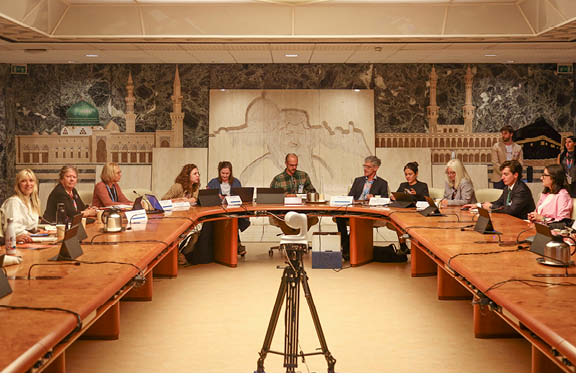How do youth-led initiatives for soil health aim to inspire action? This was explored by expert speakers and discussed for a panel at “Regeneration of soils for future generations” held on October 15 to celebrate the World Food Forum in Rome. The theme was “Good food for all, for today and tomorrow”, focusing on sustainable solutions for current and future food security challenges.
The Swedish International Agricultural Network Initiative (SIANI) organised a hybrid side event with the collaboration of the Eastern Africa Farmers Federation (EAFF), the Coalition of Action 4 Soil Health (CA4SH), the Swedish University for Agricultural Sciences and Ristolab.
Role of youth in soil regeneration and climate resilience
What was the last delicious meal that you ate? With this question in mind, SIANI started the event to help the public reconnect with their personal food experiences and reflect on the origins of their food. After this reflection, the inspirational talks kicked off.
Leon Pepe Biundo began by explaining his work at Alnarp’s Agroecology Farm, a research and education project in Sweden focused on promoting agroecological methods that enhance soil health, biodiversity, and overall farm sustainability. He encouraged the public to take care of the living microorganisms in the ground and suggested that soil health can be a sustainable solution if managed carefully.
“We believe that through agroecology and careful (management of) soil, sustainable food productions for the future are possible”, Leon said.
Following him, Lukas Paltanavicius from Cycle to Farms presented a compelling video that conveyed their vision for a healthy food system. This message embodies a commitment to supporting farmers as leaders of hope in the face of climate change, acting as catalysts for positive change and inspiring harmony between humans and nature.
“We decided that we would like to learn about regenerative agriculture through the eyes of the farmer and through putting our own hands into the soil, and I think that was the best approach we could have chosen”, Lukas stated.
Finally, Omary Mwaimu took the stage, sharing how the EAFF is taking initiatives to regenerate soils to ensure food security for future generations. He highlighted the importance to recognise that “the farmers are at the forefront of the soil crisis.”
According to World Economic Forums 2022, over half of the world’s agricultural land is degraded, leading to productivity losses of $400 billion and a projected 30% rise in food prices by 2035. Mr Mwaimu explained how EAFF empowers East African farmers with climate-smart agricultural practices that enhance soil health, food security, and climate resilience. The Federation has trained experts who have educated over 12,000 farmers – 70% of whom are youth – on sustainable practices.
EAFF advocates for prioritising soil health in global climate and biodiversity discussions. Healthy soils are essential for carbon storage, ecosystem services, and adaptation to climate change.
Reflection and discussion
On ways to improve soil health, the audience proposed some suggestions including compost, crop rotation, diversification, biofertilisers and policy initiatives. Then, moderators encouraged the participants to visualise what is needed to scale up those solutions and how they can be interconnected to drive bigger change. Answers highlighted the importance of funding, community support, education and legislation as a key element in this effort.
Additionally, a panel of experts in sustainable agriculture and development led a discussion on youth engagement, political and economic support, land reliance, knowledge sharing, and a call to action. The panel discussion included Kevin Perkins, the Executive Director of Farm Radio International, who brought over 25 years of experience in community development; Rikke Grand Olivera, the Lead Global Technical Specialist for Land Tenure and Natural Resources Management at IFAD, who shared her expertise in land governance and agroecology; Daniela Solis, Coordinator of CA4SH, who focused on global soil health initiatives; Pernilla Ivarsson, Deputy Permanent Representative of Sweden to FAO, who provided insights from her agricultural economics and food policy background; Victor Muiru, Head of Local Youth Action at World Food Forum, who highlighted the importance of soil regeneration; and finally, Sofia Cavalleri, a FAO’s Young Scientist Group member, who discussed ethnobotany and sustainable food systems.
“It is necessary that young people have the possibility to contribute to policy and take action to avoid, minimise and reverse land degradation” Pernilla Ivarsson.
Many youths rely on land and natural resources, making land degradation a critical issue. Continuous learning, research, and practical action are essential for improving soil health and achieving food security.
“I hope that those working on farms, shaping policies, and engaged in educational initiatives and capacity-building efforts will emphasise and showcase the importance of regenerating our soils, (by doing so) we can find ourselves at a place where hunger becomes a thing of the past” – Victor Muiru.
To conclude, Pernilla highlighted the crucial role of platforms such as SIANI in promoting youth initiatives and providing visibility and support to young leaders. She noted that these platforms connect new voices to global networks and resources strengthening their efforts to achieve the Sustainable Development Goals.
